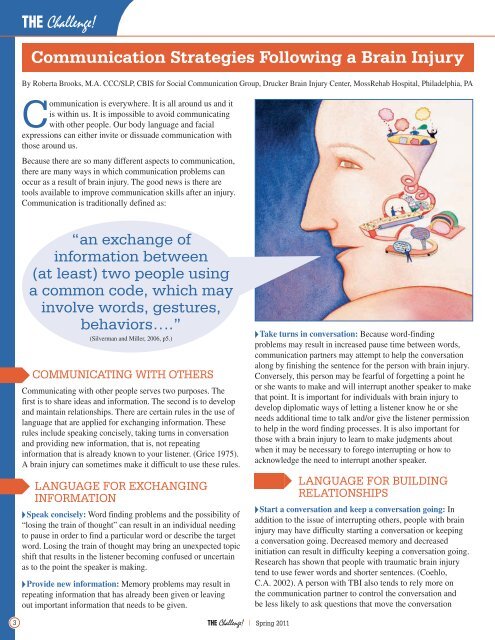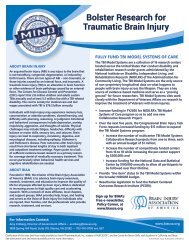THE Challenge! Spring 2011
Communication
Communication
You also want an ePaper? Increase the reach of your titles
YUMPU automatically turns print PDFs into web optimized ePapers that Google loves.
<strong>THE</strong> <strong>Challenge</strong>!<br />
Communication Strategies Following a Brain Injury<br />
By Roberta Brooks, M.A. CCC/SLP, CBIS for Social Communication Group, Drucker Brain Injury Center, MossRehab Hospital, Philadelphia, PA<br />
Communication is everywhere. It is all around us and it<br />
is within us. It is impossible to avoid communicating<br />
with other people. Our body language and facial<br />
expressions can either invite or dissuade communication with<br />
those around us.<br />
Because there are so many different aspects to communication,<br />
there are many ways in which communication problems can<br />
occur as a result of brain injury. The good news is there are<br />
tools available to improve communication skills after an injury.<br />
Communication is traditionally defined as:<br />
“an exchange of<br />
information between<br />
(at least) two people using<br />
a common code, which may<br />
involve words, gestures,<br />
behaviors….”<br />
(Silverman and Miller, 2006, p5.)<br />
Communicating with Others<br />
Communicating with other people serves two purposes. The<br />
first is to share ideas and information. The second is to develop<br />
and maintain relationships. There are certain rules in the use of<br />
language that are applied for exchanging information. These<br />
rules include speaking concisely, taking turns in conversation<br />
and providing new information, that is, not repeating<br />
information that is already known to your listener. (Grice 1975).<br />
A brain injury can sometimes make it difficult to use these rules.<br />
Language for Exchanging<br />
Information<br />
Speak concisely: Word finding problems and the possibility of<br />
“losing the train of thought” can result in an individual needing<br />
to pause in order to find a particular word or describe the target<br />
word. Losing the train of thought may bring an unexpected topic<br />
shift that results in the listener becoming confused or uncertain<br />
as to the point the speaker is making.<br />
Provide new information: Memory problems may result in<br />
repeating information that has already been given or leaving<br />
out important information that needs to be given.<br />
Take turns in conversation: Because word-finding<br />
problems may result in increased pause time between words,<br />
communication partners may attempt to help the conversation<br />
along by finishing the sentence for the person with brain injury.<br />
Conversely, this person may be fearful of forgetting a point he<br />
or she wants to make and will interrupt another speaker to make<br />
that point. It is important for individuals with brain injury to<br />
develop diplomatic ways of letting a listener know he or she<br />
needs additional time to talk and/or give the listener permission<br />
to help in the word finding processes. It is also important for<br />
those with a brain injury to learn to make judgments about<br />
when it may be necessary to forego interrupting or how to<br />
acknowledge the need to interrupt another speaker.<br />
Language for Building<br />
Relationships<br />
Start a conversation and keep a conversation going: In<br />
addition to the issue of interrupting others, people with brain<br />
injury may have difficulty starting a conversation or keeping<br />
a conversation going. Decreased memory and decreased<br />
initiation can result in difficulty keeping a conversation going.<br />
Research has shown that people with traumatic brain injury<br />
tend to use fewer words and shorter sentences. (Coehlo,<br />
C.A. 2002). A person with TBI also tends to rely more on<br />
the communication partner to control the conversation and<br />
be less likely to ask questions that move the conversation<br />
3 <strong>THE</strong> <strong>Challenge</strong>! | <strong>Spring</strong> <strong>2011</strong>


















